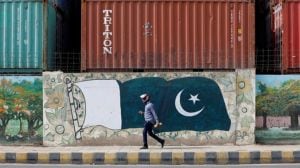Unlearning English
The rise of China is measured in so many ways,here is another.
The rise of China is measured in so many ways,here is another. With the Guangzhou Asian Games having included the cricket Twenty20 format as a medal event last year,the Chinese Cricket Association is said to be endorsing its adoption as an Olympic sport. Once cricket presents gold medal possibilities,we know how efficiently Chinas sports policy will swing into action for the inevitable,a medal-winning squad.
It would be apt. Like no other sport,cricket was spread by empire,its introduction and growth in India,the Caribbean,South Africa mirroring the messiness of the colonial encounter. In fact,the map of cricket even today cannot quite seem to grow out of the English-speaking world,and Chinas challenge,when it comes,will perhaps be the most disruptive event in cricket since Kerry Packers rebel league. For one,for the first time a non-English speaking country will have expanded crickets horizons.
Language may seem to be an odd consideration to bring into sport,but a recent book by Nicholas Ostler,a British linguist and chairman for the Foundation of Endangered Languages,appears to pose the mystery of Netherlands participation in successive cricket World Cups. In The Last Lingua Franca: English Until the Return of Babel,he divides lands where English is spoken into three circles. Its a construct favoured by many sociolinguists,and its one he will demolish. But its intriguing that all the teams in the fray fall into one of two categories: the Inner Circle,where English is the mother tongue,and the Outer Circle,where English has an official status. Only Netherlands inhabits the third,the Expanding Outer Circle,where English is taught as a
foreign language.
Interestingly,Ostler shows that the English-speaking world is better analysed as regions where it is the mother tongue and where it is the lingua franca,a connecting language. With a vibrant historical overview of the ways in which previous lingua francas spread and then receded Latin,Sanskrit,Persian he contests the popular thesis of Englishs onward popularity,so that at some indeterminate point it will have the universality of,say,mathematics and its origins in the British Isles will be a minor curiosity. He takes the 25 most widely spoken languages and calculates their lingua franca speakers as a proportion of the total number of people who speak it. Swahili tops the list,at 98 per cent that is,a very small proportion of Swahili-speaking persons count it as their mother tongue. English is third,at 71 per cent,behind Malay. Hindi incidentally is ninth,at 40 per cent. Mandarin Chinese,the second most widely spoken language in the world,is 17 per cent.
The numbers appear to favour English. But English is the last lingua franca not only because a substitute is unsighted and unlikely. Ostlers claim is more dramatic: The decline of English,when it begins,will not seem of great moment. International English is a lingua franca,and by its very nature,a lingua franca is a language of convenience. When it ceases to be convenient however widespread it has been it will be dropped,without ceremony,and with little emotion. People will just not get around to learning it,not see the point,be glad to escape a previously compulsory subject at school.
The factors forcing this retreat are demography,politics,technology. As migration moves apace and immigrants strike deeper roots in their adopted lands,Ostler contends that they will take their mother languages with them and in some cases even impose them as lingua francas in their nearer interactions. Also,as the emerging economies assert their rise,in different degrees they will be liberated from the compulsion to use a second language,especially since Englishs roots are still rather shallow in the territories conquered through empire,and the political uses of nationalism are far from diminished. English will,he says of India,mark time as new wealth trickles down and the domestic and international compulsions to know the language for self-advancement get weaker. Then what? Could India,like Latin America,hold on to the language of its former colonists and content itself with paying lip-service to indigenismo,its heroic native roots? Unlikely,he says,the scheduled languages are far too entrenched,administratively and politically.
Of course,the survival of English as a uniformly understood language too may be in doubt,with speakers in different countries nourishing it into local dialects Jamaican English,for instance,or Hinglish. Or Singlish,Singaporean English,which drove that countrys prime minister to a passionate appeal to his people to speak good English,and cleanse it of not just Malay and Chinese words but also Chinese syntax. My concern, said Goh Chok Tong in April 2000,is that if we continue to speak Singlish,it will over time become Singapores common language.
In any case,a uniformly understood language will not be missed,he argues,because language technology will take care of translation and interpretation.
Technology will henceforth mediate between different folks,and we may not require a lingua franca at all.
mini.kapoorexpressindia.com
- 01
- 02
- 03
- 04
- 05






























